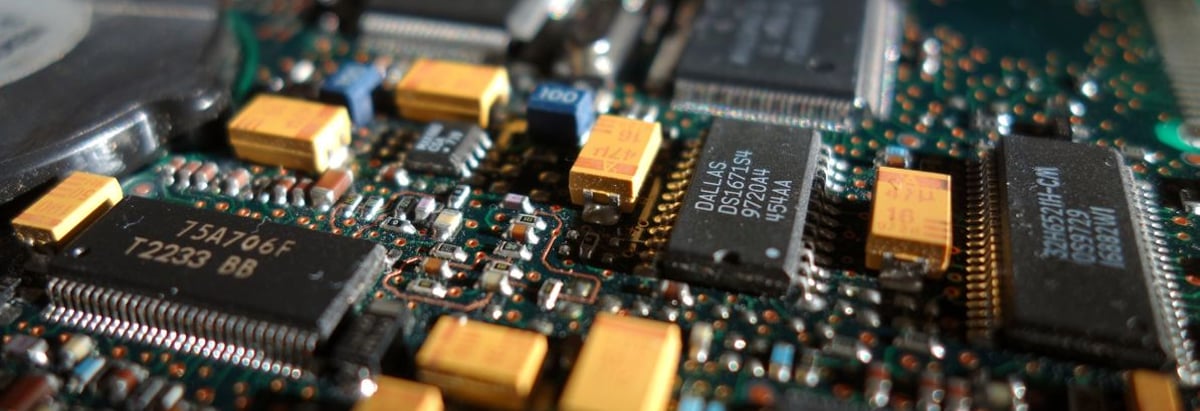Stock Analysis
- South Korea
- /
- Semiconductors
- /
- KOSDAQ:A080220
Is Jeju Semiconductor (KOSDAQ:080220) A Risky Investment?

Some say volatility, rather than debt, is the best way to think about risk as an investor, but Warren Buffett famously said that 'Volatility is far from synonymous with risk.' When we think about how risky a company is, we always like to look at its use of debt, since debt overload can lead to ruin. We can see that Jeju Semiconductor Corp. (KOSDAQ:080220) does use debt in its business. But the real question is whether this debt is making the company risky.
When Is Debt A Problem?
Debt and other liabilities become risky for a business when it cannot easily fulfill those obligations, either with free cash flow or by raising capital at an attractive price. If things get really bad, the lenders can take control of the business. While that is not too common, we often do see indebted companies permanently diluting shareholders because lenders force them to raise capital at a distressed price. By replacing dilution, though, debt can be an extremely good tool for businesses that need capital to invest in growth at high rates of return. When we think about a company's use of debt, we first look at cash and debt together.
View our latest analysis for Jeju Semiconductor
How Much Debt Does Jeju Semiconductor Carry?
The image below, which you can click on for greater detail, shows that Jeju Semiconductor had debt of ₩17.0b at the end of September 2024, a reduction from ₩19.5b over a year. However, it also had ₩16.3b in cash, and so its net debt is ₩707.2m.
How Healthy Is Jeju Semiconductor's Balance Sheet?
We can see from the most recent balance sheet that Jeju Semiconductor had liabilities of ₩40.9b falling due within a year, and liabilities of ₩1.97b due beyond that. On the other hand, it had cash of ₩16.3b and ₩55.2b worth of receivables due within a year. So it actually has ₩28.6b more liquid assets than total liabilities.
This surplus suggests that Jeju Semiconductor has a conservative balance sheet, and could probably eliminate its debt without much difficulty. Carrying virtually no net debt, Jeju Semiconductor has a very light debt load indeed.
In order to size up a company's debt relative to its earnings, we calculate its net debt divided by its earnings before interest, tax, depreciation, and amortization (EBITDA) and its earnings before interest and tax (EBIT) divided by its interest expense (its interest cover). Thus we consider debt relative to earnings both with and without depreciation and amortization expenses.
Jeju Semiconductor has barely any net debt, as demonstrated by its net debt to EBITDA ratio of only 0.041. Happily, it actually managed to receive more interest than it paid, over the last year. So it's fair to say it can handle debt like an Olympic ice-skater handles a pirouette. In addition to that, we're happy to report that Jeju Semiconductor has boosted its EBIT by 60%, thus reducing the spectre of future debt repayments. When analysing debt levels, the balance sheet is the obvious place to start. But you can't view debt in total isolation; since Jeju Semiconductor will need earnings to service that debt. So when considering debt, it's definitely worth looking at the earnings trend. Click here for an interactive snapshot.
But our final consideration is also important, because a company cannot pay debt with paper profits; it needs cold hard cash. So we clearly need to look at whether that EBIT is leading to corresponding free cash flow. In the last three years, Jeju Semiconductor created free cash flow amounting to 7.4% of its EBIT, an uninspiring performance. For us, cash conversion that low sparks a little paranoia about is ability to extinguish debt.
Our View
Jeju Semiconductor's interest cover suggests it can handle its debt as easily as Cristiano Ronaldo could score a goal against an under 14's goalkeeper. But we must concede we find its conversion of EBIT to free cash flow has the opposite effect. Zooming out, Jeju Semiconductor seems to use debt quite reasonably; and that gets the nod from us. While debt does bring risk, when used wisely it can also bring a higher return on equity. Over time, share prices tend to follow earnings per share, so if you're interested in Jeju Semiconductor, you may well want to click here to check an interactive graph of its earnings per share history.
If, after all that, you're more interested in a fast growing company with a rock-solid balance sheet, then check out our list of net cash growth stocks without delay.
New: Manage All Your Stock Portfolios in One Place
We've created the ultimate portfolio companion for stock investors, and it's free.
• Connect an unlimited number of Portfolios and see your total in one currency
• Be alerted to new Warning Signs or Risks via email or mobile
• Track the Fair Value of your stocks
Have feedback on this article? Concerned about the content? Get in touch with us directly. Alternatively, email editorial-team (at) simplywallst.com.
This article by Simply Wall St is general in nature. We provide commentary based on historical data and analyst forecasts only using an unbiased methodology and our articles are not intended to be financial advice. It does not constitute a recommendation to buy or sell any stock, and does not take account of your objectives, or your financial situation. We aim to bring you long-term focused analysis driven by fundamental data. Note that our analysis may not factor in the latest price-sensitive company announcements or qualitative material. Simply Wall St has no position in any stocks mentioned.
About KOSDAQ:A080220
Jeju Semiconductor
Provides memory semiconductor solutions worldwide.

